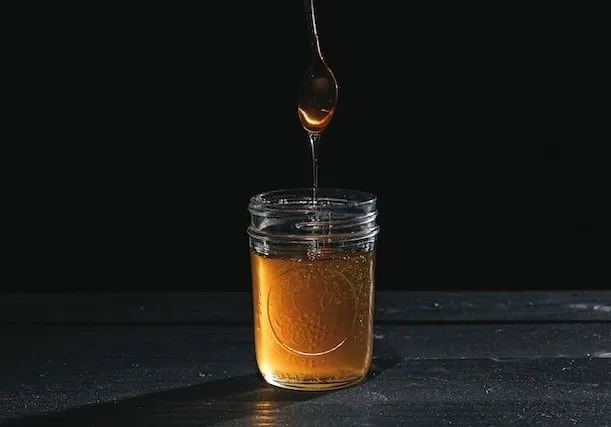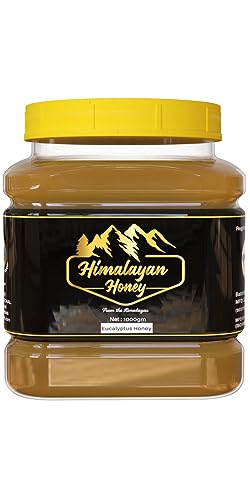Have you ever smelled Eucalyptus? If yes, then you probably already have a definite feeling about its scent. This is the same smell you would experience when you try raw Eucalyptus Honey.
While some absolutely love its relatively distinct taste and trademark smell, others may veer away from it. Nevertheless, the fact remains that this bold honey adds a characteristic flavor and aroma to your food and beverages.
In this blog post, we provide you with a more in-depth look at Eucalyptus honey. We take a look at its origin, components, uses, and health benefits.
The Eucalyptus Plant
Also known as the Tasmanian blue gum, fever tree, or stringy bark tree, the Eucalyptus plant (Eucalyptus globulus) belongs to a wide genus of flowering trees and shrubs in the myrtle family, Myrtaceae.
Among the many eucalyptus species, the Eucalyptus globulus rapidly grow and easily adapts to various weather conditions. Hence, it is the main source of eucalyptus honey.
It is native to Australia, where Koala bears feed on their leaves. Then, it was introduced to other parts of the world, including South Africa, in the early 20th century. They can grow up to 98–180 feet tall. Cultivated mainly along the coasts, the Eucalyptus tree flourishes best in the coastal areas.

Eucalyptus Oil
In Australia, the cultivation of these trees is predominant, specifically for the extraction of eucalyptus essential oil from their leaves.
Eucalyptus oil is popular as a complement to other essential oils, like thyme essential oil, lavender essential oil, and rosemary essential oil. Hence, people seriously maintain plantations of eucalyptus trees.
Essential oil from eucalyptus is also one ingredient prominently used in many skincare products, household cleaners, and other cleaning products.
Due to the wide plantation of these trees for eucalyptus oil, bees have enough blossoms to forage nectars from. In addition, the honey bees forage the honeydew from the barks and branch tips too.
The exact ratio of blossom to honeydew honey will vary. But, nectars from its blossoms will always be the predominant source due to the plant’s voluminous production of nectar.
Sourced predominantly by a honey bee from a single plant species, this variety of honey is monofloral. Hence, it has a specific taste, fragrance, and flavor.
Artisanal beekeepers know the provenance of their honey. They take their hives to forests where the individual species of eucalyptus trees predominate.
Each of these has different pollen types, which give the honeys their individual flavors.
Species of Eucalyptus
There are a few eucalyptus trees of different species. All the nectar of the flowers of these species is the main source of eucalyptus honey.
Yellow Box (Eucalyptus melliodora)
The Yellow Box or Eucalyptus melliodora is a common species found in some states in Australia. It blooms from August to December, which is springtime there. It is one of Australia’s premium sources of honey and is their most popular variety.
Grey Iron Bark (Eucalyptus paniculata)
The states of New South Wales and Victoria have the Grey Iron Bark or Eucalyptus paniculata. It does not blossom yearly but has large flowerings every few years in the cooler months.
Stringy Bark (Eucalyptus caliginosa)
Stringy Bark or Eucalyptus caliginosa trees thrive in the Northern Tablelands in northern New South Wales. It blossoms during late autumn and into winter.
Rough-barked Apple (Angophora Floribunda)
Found in New South Wales, Queensland, and Victoria is the Eucalyptus Florida or Angophora Floribunda or, more commonly, rough-barked apple. It flowers in the Australian summer months of December, January, and February.

Characteristics of Eucalyptus Honey
Unlike most types of honey, eucalyptus honey has a distinct aroma that makes it unique.
As to physical properties, the difference between other varietals and this honey is quite obvious.
This variety is normally dark brownish-orange or dark amber with a dull greyish tone in color.
Its scent is pungent with a hint of menthol. The aroma makes it evident that eucalyptus is a stronger and more distinctive honey.
This liquid gold is best consumed unfiltered and unheated as raw eucalyptus honey.
The taste is medium-sweet with a rather distinguishable herbal flavor. It also has a hint of caramel that some identify more like butterscotch. It can range from tart to sweet.
Surprisingly, there is no bitterness to it and only a slightly woody and medicinal aftertaste.
Honey from the eucalyptus tree has a high fructose content, so it crystallizes fairly quickly with fine to medium crystals.

What is Eucalyptus Honey good for?
Unlike most honey varieties, eucalyptus honey contributes more than just sweetness when used in the kitchen.
As a sweetener for tea, it will add its own rich flavor with a taste of menthol. When drizzled over a wide range of foods, it may affect the flavor of every course or menu.
Good choices to match with this honey are fruits and blue cheese. It will add a notable tang to salad dressings and marinades, even when used in small quantities.
This golden syrup can also be used in cooking or baking. But again, its distinctive flavor may alter the taste you expect from the finished product. This one is also suitable for brewing mead at home.
Benefits of Eucalyptus Honey
Is raw eucalyptus honey good for you?
Besides its distinguishable traits, what makes it so special is the numerous health benefits of Eucalyptus honey. This honey has health benefits that other honey varieties may not have.
Its amazing therapeutic abilities seem non-exhaustive. It is anti-inflammatory, antispasmodic, decongestant, deodorant, antiseptic, antibacterial, and stimulating. The only way to get its full health benefits is to consume this raw honey on a regular basis.
Raw eucalyptus honey contains much more vitamin C and vitamin B9 than other monofloral honey. It also has traces of potassium, copper, iron, and calcium to boost the immune system.
The eucalyptol compound that gives this honey its trademark aroma and taste is a potent anti-inflammatory on its own.
It boasts strong antioxidant properties with high flavonoid components. It protects cells from damage and oxidative stress that could worsen inflammation and aging.
This honey variety is often used with great effectiveness to treat coughs and colds. It is a natural remedy for ailments of the upper respiratory organs.

The menthol-like properties of eucalyptus make it an excellent decongestant, and it has strong expectorant power to clear mucus. Thus, people anticipate that it may eventually be the first-line treatment for more serious respiratory problems.
It is also believed to be effective at combating insomnia, the same way eucalyptus oil does.
Typically, it has a high level of hydrogen peroxide as well as low moisture content and low pH level. This makes it an exceptional antiseptic and antibacterial and reduces the growth of bacteria at the site of infection.
It cleanses the urinary tract and heals diseases of urinary passages by inhibiting the growth of bacteria such as Staphylococcus aureus and Escherichia coli.
This type of honey is effective when used for healing wounds, ulcers, burns, cuts, abrasions, and sores. It has also been proven to be effective on insect bites and stings. All these are thanks to its germicidal properties.
This honey variety also acts as a vasodilator. It helps in treating respiratory problems, heart diseases, and high blood pressure.
Often recommended to patients suffering from nerve pain, massaging this raw honey on the skin’s surface helps.
Best Eucalyptus Honey
Curious to try the honey eucalyptus plants provide? Or has tried it and looking forward to buying your next jar?
Here are three options available on Amazon.com.
BEE HARMONY Eucalyptus Raw Organic Honey, 12 OZ
See on AmazonEucalyptus honey Himalayan 1000g premium quality organic/unprocessed/Nepal
See on AmazonEucalyptus Organic Raw Honey from Eucalyptus Flowers, Artisanal from Sardinia, Italy, 8.8 oz
See on AmazonSpecial Precaution
The presence of cineol, or eucalyptol, is a bit of a concern for people who ingest this honey. This compound supplies the aromatic profile of eucalyptus oil. When ingested in high amounts, it may have toxic effects.
Unfortunately, some of these substances may find their way into the honey through pollen and nectar. In some instances, bees may pick up traces of this natural oil when harvesting the trees’ sugary honeydew.
An overdose of cineol can trigger life-threatening effects. Symptoms include nausea, vomiting, diarrhea, central nervous system depression, low blood pressure, collapse, and coma.
Children, the elderly, and diabetics are particularly at risk. As little as a tiny drop of oil can lead to these symptoms.
But as long as you ensure that your eucalyptus honey is manufactured by trusted sources who follow quality control standards and you consume it only in moderate amounts, then there is nothing to be alarmed about.




Leave a Comment
Your comment will be reviewed before appearing on the site.